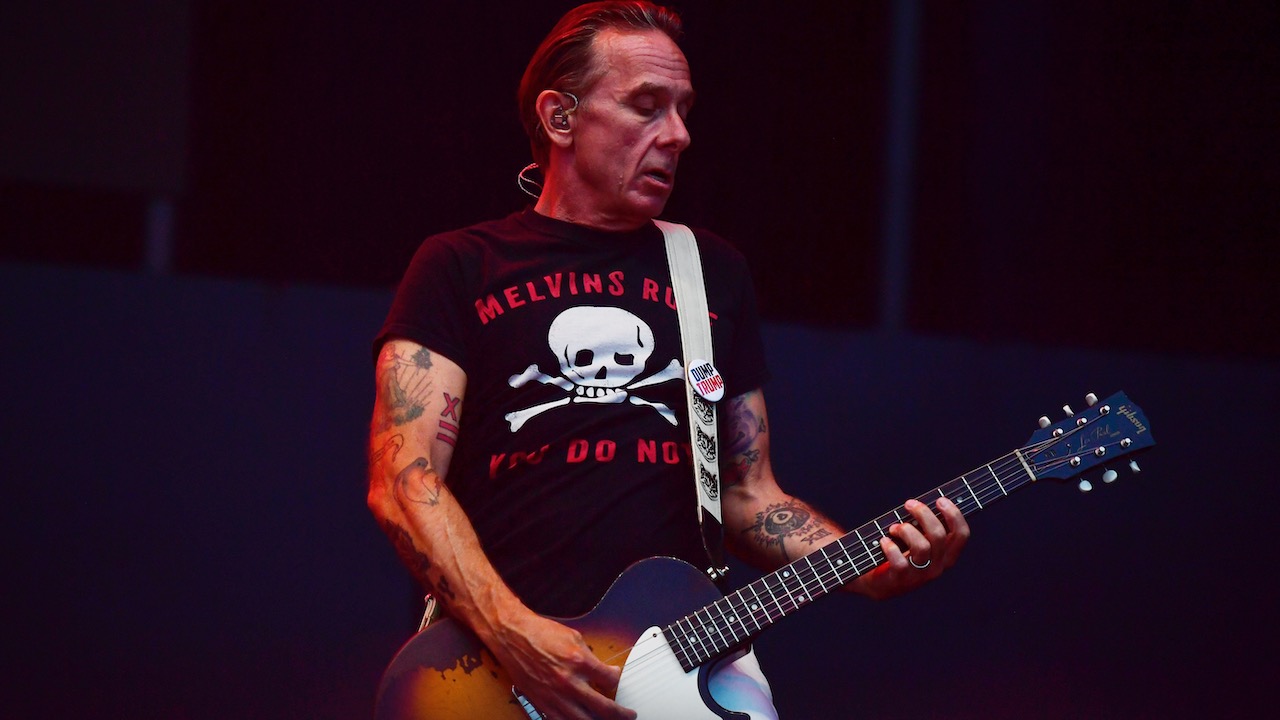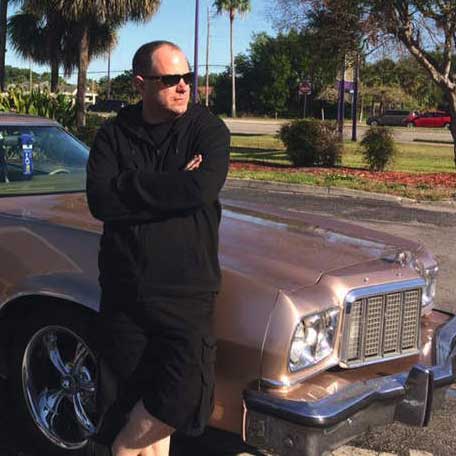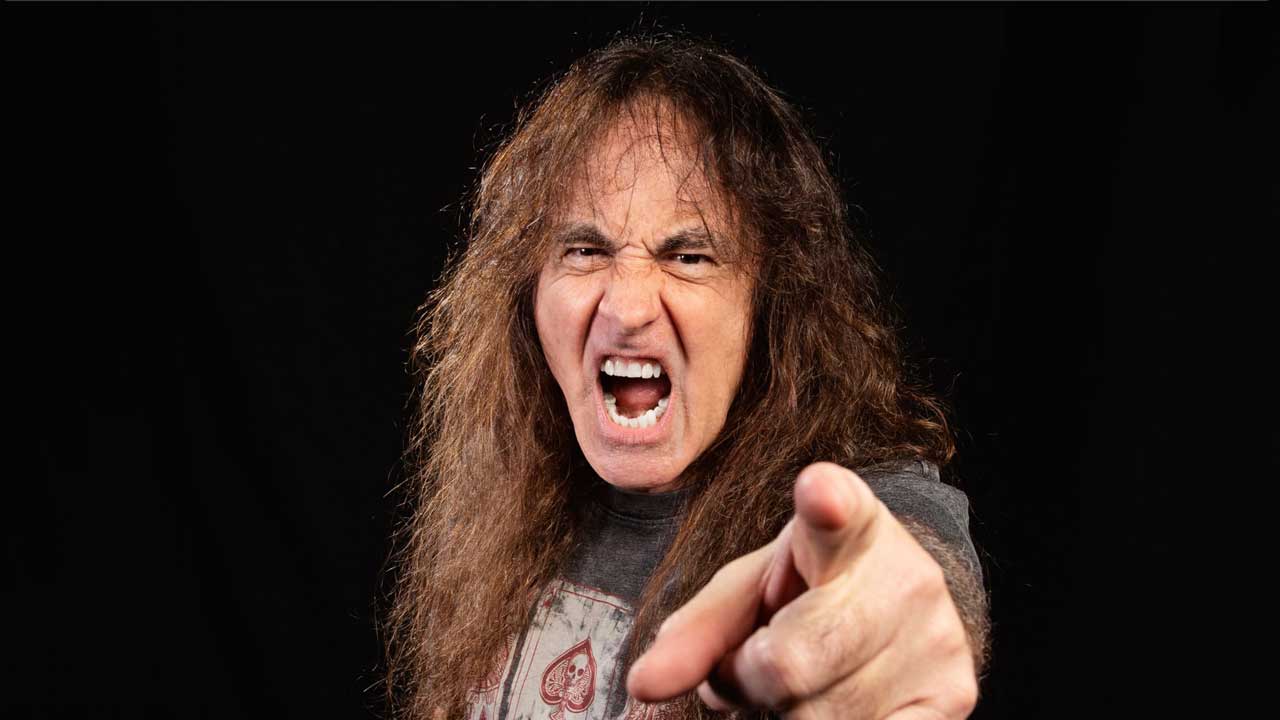Bad Religion's Brian Baker: 10 Albums That Changed My Life
Punk rock lifer Brian Baker (Bad Religion/Minor Threat/Dag Nasty/Samhain and more) chooses his platters than matter

A child prodigy guitarist who once played on stage with Santana, Brian Baker joined Minor Threat in 1980 at the age of just 15.
The Washington DC band already had a guitarist in Lyle Preslar, so the teenager made do with bass, later switching to guitar when the band expanded to a quintet on 1983's Out Of Step album. Despite their entire discography famously clocking in at under 48 minutes, Minor Threat remain notable as hardcore pioneers alongside Bad Brains and Black Flag.
Following their split in 1983, Baker served time with The Meatmen (Tesco Vee’s notoriously transgressive punks), Glenn Danzig's Samhain, Doggy Style, Government Issue, Dag Nasty and major label hard rock outfit, Junkyard, before turning down the offer of touring guitarist with REM in favour of joining Bad Religion in 1994 following the departure of founding guitarist Brett Gurewitz. He’s now recorded 10 albums with Bad Religion throughout 28 years with the band.
Most recently, the guitarist recorded the debut album Rat Beat with his Asbury Park beach community neighbours who make up the retro 80s punk side project Beach Rats: Ari Katz of Lifetime on vocals, Danny Windas of Let It Burn on drums and Bouncing Souls’ guitarist Pete Steinkopf and bassist Bryan Keinlen.

The Ruts – The Crack (1979)
"I wasn't made aware of it until maybe 1980 when I went punk. I heard it in context with a lot of those first bands that I was attracted to – like The Damned and US bands like Black Flag and Circle Jerks. But there was something about The Ruts which was just so precise. The performances were so strong.
"At the time, I didn't really know that [guitarist] Paul Fox was kind of doing Mick Ronson because I didn't really know who Mick Ronson was. That style of guitar playing and the fact that this was a punk band, but they didn't look really punk. Segs and Ruffy had that jazz-based technicality in their playing, yet it's still a punk band because of [vocalist] Malcolm Owen. It just hit all the buttons for me."
The Damned – Machine Gun Etiquette (1979)
“Because it’s the first Damned album I ever owned. It’s so wildly different to the first and second records. Captain Sensible is such a different guitar player to Brian James or even the second record with both Lu Edmonds and Brian James.
"It's so much more theatrical. The songs were so incredibly developed and there's so much guitar on it. No offence to The Clash, but Captain Sensible was all the guitarists that [Joe] Strummer and [Mick] Jones were – and more. Captain Sensible was my guy.”
AC/DC – Powerage (1978)
"It’s their best album. This was my rock guitar solo primer. I started playing guitar when I was eight in 1973 but I didn’t really start to get serious until about 1978 and that’s when Powerage appeared. So that was my first AC/DC exposure, then I became a fan of everything else by them subsequently.
"It's just the right record. It’s the right Bon Scott. There is a rawness to it – it sounds like it's recorded in a living room. There are lots of mistakes in it, it's just a real record. It still gives me chills when I hear it. It's how I first learned to play guitar solos – a little bit of George Harrison and a lot of Angus Young!
"But Malcolm Young is the real gem. When you become an AC/DC lunatic, you discover how important Malcolm is on the sonic spectrum and in Powerage you can clearly hear it. Because the guitars are so separated – you can really hear what he's doing and his tone."
The latest news, features and interviews direct to your inbox, from the global home of alternative music.
ZZ Top – Tres Hombres (1973)
"This is how crazy this is: I didn’t really know who ZZ Top were. I got a Stevie Ray Vaughan record in 1983 – Texas Flood – and through that I went back and discovered ZZ Top. And through ZZ Top that’s how I found Elmore James. And Son House. And Albert King. It was this huge lifeline from Stevie Ray Vaughan. It’s like an Offspring kid who then discovers Bad Religion. And then discovers Yes and Utopia and the Sex Pistols! It’s the same cycle of going further back to find the influence.
"ZZ Top and Billy Gibbons came late in my development, but fortunately just in time for the band Junkyard. So when I joined a bluesy/AC/DC/Motörhead/ZZ Top band I was ready to go because I knew how to play Tush."
Van Halen – Van Halen (1978)
"You have to understand the impact of Van Halen. It wasn’t about it being metal or hair metal, it sounded like nothing else. It was a miracle. And it was scary.
"I wasn’t a fan of the entire Van Halen oeuvre – I just liked that record. Really shocking, dry, guitar one side, bass one side. It was just a revolutionary stripped-down sound, and the guitar gymnastics were something that had never been heard before. All of us learned how to play Eruption – badly – and the best of us decided never to put our right hand on the fingerboard ever again. At the time it was incredibly influential."
Motörhead – Ace of Spades (1980)
"This was my first Motörhead experience. It's everything. It's sped up rock ’n’ roll by people on speed. The sound is monstrous, the distorted bass, Lemmy's vocal… everything that makes Motörhead so important to all of the conversations we have about rock music.
"They looked badass. They were punk but they didn't have short hair. It was just this crazy combination of things that I was attracted to, of rage and noise. But underneath it you got Jerry Lee Lewis. And Elvis. It's crazy what Motörhead made. Beautiful.
"And it was the best logo in the world. I mean, just the writing alone was so cool! Punks who didn't even listen to Motörhead had Motörhead along with the Sex Pistols on their jackets. Because it was such a great logo.
"Motörhead were responsible for countless subsequent bands of every size."
The Beatles – Revolver (1966)
"My first exposure to music came from my parents. I also went to a Montessori school when I was very young and there was a lot of music in that programme. I’m not really a student of that teaching idea but my parents were kind of hippies and this was the 70s in the USA, man!
"Revolver was when I started to get more serious about guitar. The first riff I played was Taxman, the first time I knew not to play a chord. The Taxman solo – which was apparently played by Paul – I still do that! That aggressive, kind of discordant intro that moves. I will do that tonight at a Bad Religion show. It just comes out of me. It’s steeped in.
"Were my parents musical? No, but there was music on in the house all the time. They would have parties on the weekends, which now in retrospect, I can imagine was everyone just wasted and stumbling around. They’d be cranking Hendrix and the police would come and tell them to turn it down. My parents looked cool. They were doing their cool thing. But now that I'm much older than they were when they had me, I would be making fun of them. ‘Yeah, Tame Impala rules… take off your fur coat, you asshole.’ That’s how it works…"
Discharge – Realities of War EP (1980)
"It’s not an album? But it is! Realities of War counts because it’s the first Discharge that I ever heard. In the States we didn’t get the same kind of Discharge – we got compilations.
“For me, it was the cover – the jacket. But the sonics… it was low-fi chaos. It was about to fall apart at any time. It was so much rawer and more destructive than Black Flag, who were scary to me. It was the first time I had heard anything of its kind and I was immediately attracted to it.
"I love the simplicity of the language. One sentence would be a whole song. Just the sonics – that whole Clay Records thing. This mess, this beautiful mess. I’d never heard anything like it and from that point on, I’ve been a Discharge fan my entire life. I’m still getting a Never Again tattoo. I carry around a picture of it in my phone.”
Black Flag – Nervous Breakdown EP (1979)
"With a lot of these records, it would have been Henry Rollins giving them to Michael Hampton (guitarist in The Faith, and a bandmate of Rollins in State of Alert) who was my childhood best friend. So that’s how I discovered them, through Michael, from Rollins. That’s how the whole tiny DC timeline worked together.
"It’s my favourite Black Flag record, by far. The Jealous Again 12” is up there too for me. It’s so low-fi and frightening and it was punk that wasn’t fast. I associated punk with tempo, but this was just slow and mean and I loved it.
"Greg Ginn made up his own sound and he made his own equipment. I don't think that there was any intention to be punk. Black Flag came from that era in Los Angeles punk where anything out-there and experimental could play the same show. It wasn’t like a hardcore scene where every band kinda sounded the same. He was this crazy guy with a soldering iron who expressed himself in this crazy way. Completely unique and immediately identifiable."
U2 – Boy (1980)
"I didn’t get into it until 1983 – because it was guitar pedals. I’d never been interested in music with that electronic addition, the reverbs and the delay. It was so spatial: U2 sounded enormous. I didn’t understand production at that point. I didn’t know why things sounded the way they did. U2 just sounded like this enormous thing made by four guys.
"I was still very influenced by The Edge when I started Dag Nasty. I started playing pedals with Dag Nasty and if you listen to the first two albums (Can I Say and Wig Out at Denko’s) you really hear a lot of Edge stuff. It was just a revolutionary thing to me. The songs and the melodies were so great. And I was finally understanding what backing vocals did as a musician. With the Beatles you’d think I might have figured it out, but I guess it didn’t apply to my playing in any way.
“I’ve always had a soft spot for U2. I didn't keep up with them. I think by The Unforgettable Fire I wasn't really following them, but you can't deny the amount of influence that Boy had on my playing.
"Did we all want to develop Minor Threat’s sound to be more melodic, but Ian MacKaye didn’t? Yes, Ian was right, and we were wrong. What Ian was doing was not just a band, Ian was building a community. He was so far ahead of his time and was thinking about the idea of Dischord and several bands and having this kind of reciprocating relationship with other artists. He was so big picture. But I was like: ‘I want to play bigger shows, I want to tour more. Minor Threat is a great little punk band, but have you heard the Boy album…?’
"I was dumb! And he wasn’t. So Minor Threat fortunately stopped exactly when it did. In retrospect, that's part of the beauty of it. We didn’t stay together long enough to make any real shit music. That's nice, because now the history is preserved accurately."
Bad Religion play Rebellion festival on August 4. The debut Beach Rats album Rat Beat is released on Epitaph on July 29.
A regular contributor to Louder/Classic Rock and The Quietus, Burrows began his career in 1979 with a joke published in Whizzer & Chips. In the early 1990s he self-published a punk/comics zine, then later worked for Cycling Plus, Redline, MXUK, MP3, Computer Music, Metal Hammer and Classic Rock magazines. He co-wrote Anarchy In the UK: The Stories Behind the Anthems of Punk with the late, great Steven Wells and adapted gothic era literature into graphic novels. He also had a joke published in Viz. He currently works in creative solutions, lives in rural Oxfordshire and plays the drums badly.

